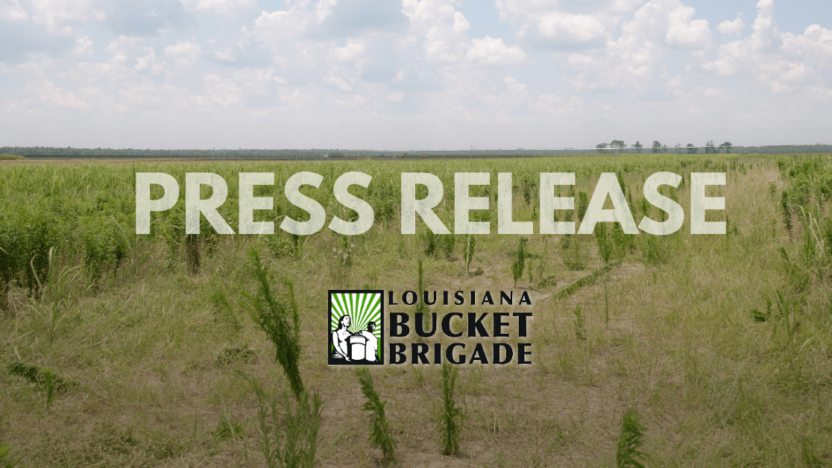
PRESS RELEASE: Westlake Chemical Explosion Caused by Toxic Carcinogen Demonstrates the Immediate Danger of Petrochemical Industry to Fenceline Communities
This morning, a massive explosion involving Ethylene Dichloride, a flammable carcinogen, erupted at the Westlake Chemical facility in Westlake, Southwest Louisiana. The explosion is still being investigated and its full impact on neighboring communities is unclear. Six people have been reported injured.
Westlake Chemical is located directly next to residential neighborhoods, many of which are low-income households and are temporary FEMA housing for people that are still recovering from Hurricanes Laura (2020) and Delta (2020). The facility is also very close to the Maplewood neighborhood and Maplewood Middle and Elementary Schools. Residents have reported smells of toxic pollution and fumes coming from Westlake, as well as air and noise pollution from massive flares that sound like the loud roar of a train.
Westlake Chemical has a running history of severe pollution events that have affected the environment and public health of Southwest Louisiana. In 1994, Westlake Chemical released chlorocarbons, including ethylene dichloride, that lead to seafood consumption advisories that prevent people from fishing and recreating in the Calcasieu River, which are still in place today. Westlake, then PPG Industries, was the focus of the “inconclusive” dioxin in humans investigation by the Agency for Toxic Substances and Disease Registry in the early 2000s. According to ProPublica’s new daunting report on sacrifice zones, the Westlake area has a cancer risk that is 8.5 times the EPA’s acceptable risk level.
Coinciding with today’s explosion at Westlake Chemical, the US Environmental Protection Agency (EPA) announced this morning the “first in a series of actions responding directly to concerns of communities historically and disproportionately impacted by pollution”, including Mossville, Louisiana. These series of actions follow Regan’s “Journey to Justice Tour” from Mississippi to Houston, Texas, during which he made a stop at Mossville, a small, historically Black town founded by formerly enslaved people located less than ten minutes away from the Westlake Plant in Sulphur. Mossville was bought out by South African chemical giant Sosal after heavily poisoning the community with toxic chemicals. Regan did not stop in Lake Charles, Sulphur, or other highly industrialized areas of Southwest Louisiana that also face daily threats of pollution and explosions.
Roishetta Ozane, founder of Vessel Project and Southwest Louisiana Organizer with Healthy Gulf, issued the following statement:
“I am out here risking my health to make sure that people know the truth and the community gets honest reporting. I need to make sure that this situation isn’t sugar coated for Westlake Chemical. I can smell chemicals through my two masks even after Westlake lifted the shelter in place and said that vapors have dissipated. I could see the huge plume from the door of my FEMA house outside of the plant. People need to band together to let industry know this is unacceptable. This disrupted everyone’s day, no matter who you are or where you work, we were all concerned about this explosion. We’re all calling our families and loved ones because we know how serious this is and how it affects everyone. This community deserves better. We deserve better response and more transparency.”
James Hiatt, Southwest Louisiana Coordinator with Louisiana Bucket Brigade, issued the following statement:
“My heart and prayers are with the individuals and families who are suffering from this man-made disaster today. For years we’ve heard the only choice is flaring or explosions – that it’s just the cost of doing business. This narrative and way of being is complete nonsense. The truth is: there are other options that do not carry the same potential for catastrophe for our people, communities, and environment. This is an instance where hazard-recognition and mitigation has failed. The industry’s lack of a strong safety and caring culture for workers and the community has resulted in a terrible, yet preventable explosion. We must not allow these companies to gloss over their negligence as they continue to place their profits over our people.”
Darryl Malek-Wiley, Louisiana Environmental Justice Organizer for Sierra Club, issued the following statement:
“For years these ‘Chemical Time Bombs’ have put the communities of Westlake, Mossville, Maplewood, and Sulphur at increased risk from pollution and chemical accidents. It is time for EPA, OHSA, and the Chemical Safety Board (CSB) to require chemical plants to reduce risk of accidents that impact workers and community members. I hope that lessons learned from Mossville will be properly integrated into EPA Administrator Regan’s follow-up actions to his Journey to Justice tour, so that Southwest Louisiana is protected from fossil fuel and petrochemical pollution and these big corporate polluters are held accountable.”
General Russel Honoré, head of GreenArmy, issued the following statement:
“We’ve been here before, but enough is enough. Westlake Chemical is growing their list of dangerous chemical-polluting incidents. The explosion has injured several people and reinforces the idea that every plant should have an EPA inspection team on site everyday. These powerful fossil fuel corporations try to avoid the already-too-relaxed rules and routinely violate the Clean Air and Clean Water Act, but often see minor slaps on the wrist for their violations. We hope the best for the people that were injured. It’s time that residents of Southwest Louisiana get control of their public safety and health and out of the hands of these super polluting plants.”
